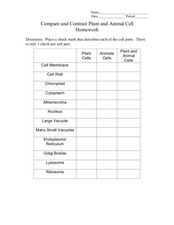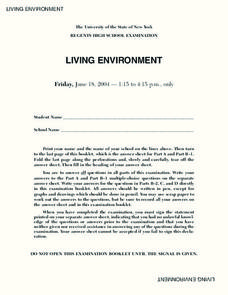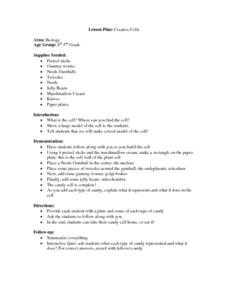Curated OER
Cell Structure and Function
Students compare the organelles present in plant and animal cells. For this biology lesson, students create an analogy to easily remember their assigned organelles. They also research their function and write a creative story.
Curated OER
Reading Comprehension Worksheet: Cells
In this cell worksheet, students read a short passage about simple cells or ground cells found in stems and leaves of plants. Students then answer four questions about the text.
Curated OER
Genetics and Heredity: The Next Generation
Tenth graders work in teams to order events of DNA transcription and translation protein synthesis. In the second instructional activity, they put the steps of mitosis and meiosis in order using a concept map poster. They use modeling...
Curriculum Corner
Coniferous and Deciduous Trees
What are the differences between coniferous and deciduous trees? Supplement your tree lessons with a set of activities that has learners describing, naming, comparing, and reading about deciduous and coniferous trees. The activities are...
LABScI
Photosynthesis: How Do Plants Get Energy?
Examine the mechanism of photosynthesis through different light scenarios. Pupils vary the amount and type of light exposure on plant leaves in the fifth lesson plan in a 12-part series. Through observation, they determine the rate of...
Curated OER
Seeing Cells
Sixth graders study living cells and their functioning units. In this cell lesson students color cell diagrams, answer questions and discuss the differences between plant and animal cells.
Garden Earth Naturalist Club
Parts of a Flower! Flower Dissection
Sometimes the best way to learn about plants is to see the different parts of a plant yourself. Groups of learners dissect flowers to answer questions about what they observe and what they wonder about their flower.
Federal Reserve Bank
Why Scarce Resources Are Sometimes Unemployed
Why do markets operate inefficiently when the world's resources are so limited? Review the various types of unemployment that exist and why some resources, especially human resources, go unused.
Curated OER
Cell Growth and Division
In this biology worksheet, 9th graders label the diagrams with the appropriate phase of mitosis illustrated. Then they explain why skin cell undergo mitosis continuously. Students also explain why mitosis is a form of asexual reproduction.
Curated OER
Use of Microscopes and Creation of Slides
Students explore the use of microscopes and the creation of slides. They practice using, adjusting and viewing with a microscope. they view slides of familiar substances such as blood and fibers. In addition, they create slides using...
Curated OER
Sets of Chromosomes
In this chromosome worksheet, students answer eighteen questions about chromatids, chromosomes, types of reproduction, haploid and diploid cells and zygotes.
Curated OER
Blend-A-Plant Levels of Organization
Students' identify and analyze the levels of organization and the emergent properties through experimentation. Students' apply the differences in the properties of a plant before and after it has been subjected to a kitchen blender.
Biology in Motion
Organize-It
Many pupils struggle to categorize and organize related content. Multiple quizzes on a variety of topics offer practice for these specific skills. Scholars move items around until they think each is placed in the proper position....
Curated OER
Design a Plankton
Students explore animal and plant adaptation. In this ecosystems science lesson, students view websites to gain information about plankton and its interdependence within ecosystems. Students identify ways in which plankton...
Curated OER
Compare and Contrast Plant and Animal Cell
In this plant and animal cells worksheet, students complete a chart, checking features that describe cell parts. Features will describe either plant, animal, or both types of cells.
Curated OER
Chalkboard Challenge: Science Vocabulary
Students play a Jeopary-style game in this engaging PowerPoint. The scientific categories are the solar system, planet, weather, cells, and rocks. These types of interactive games are an excellent way to reinforce the important...
Curated OER
Plants: Form and Function
In this plants worksheet, learners compare and contrast vascular and non-vascular plants. Students learn the structure and function of the 3 types of plant tissues: dermal, ground, and vascular tissue. This worksheet has 27 fill in the...
Curated OER
Living Environment
For this environmental worksheet young scholars complete a series of multiple choice and short answer questions on cell types, cell division, chromosomes and plant species.
Curated OER
Biology: Creative Cells
Students use various snacks to make large models of human cells. Items such as gumballs, gummy worms, and jelly beans represent the nucleus, golgi bodies, and mitochondria. As each piece of candy is added, the teacher explains what it...
Curated OER
Germination Inhibitors
In germination experiment activity, learners conduct the following lab activity. Students determine the effects of another tomato on germinating seeds. Learners answer the following questions to analyze their experiment.
Curated OER
Amoeba
In this amoeba worksheet, high schoolers read about the structures of the amoeba and their functions. They answer twelve questions about the amoeba and color given structures on a diagram of an amoeba.
Teach Engineering
Edible Algae Models
Sometimes it's okay to eat your science experiment. A hands-on activity has pupils create models for algae to learn about its cellular structure. The best part of the experiment? The resulting juice-filled gels are edible—yum!
Biology Junction
Photosynthesis: Energy and Life
All life requires energy ... and the connection between energy and plant life typically requires photosynthesis. Scholars explore photosynthesis in depth from ATP/ADP through the Calvin cycle. A helpful presentation highlights concepts...
Curated OER
Support and Transport in Plants
All types of transport systems in a dicotyledon plant are detailed here, with clear labelled diagrams and notes for the specific structures and functions. The way that these systems have adapted, and how support is assisted by the...























